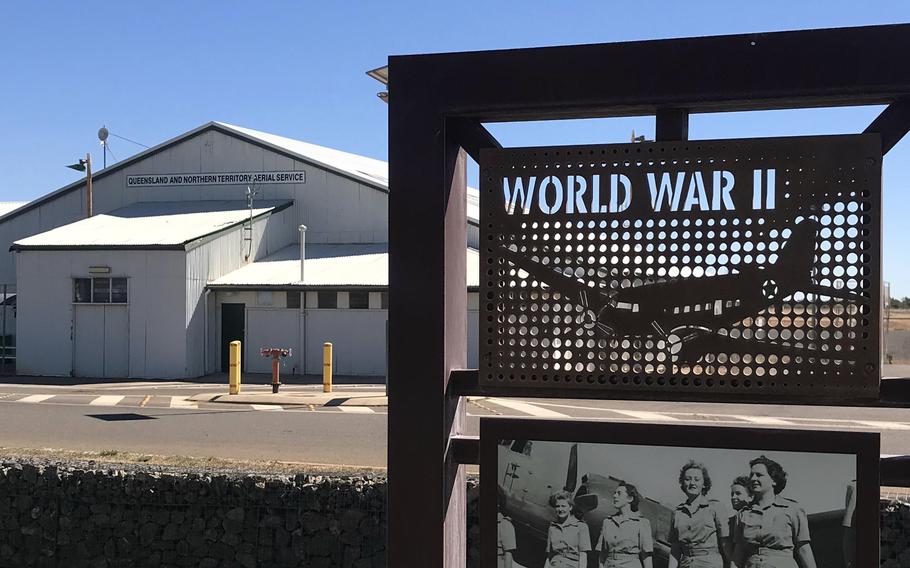
Three squadrons of U.S. Army Air Force B-17 Flying Fortress bombers were deployed to Cloncurry, Australia, during World War II. (Seth Robson/Stars and Stripes)
CLONCURRY, Australia — Australian troops and their U.S. Marine Corps guests will host an open house this week to give residents of this Outback mining and ranching town a closer look at the service members and their equipment.
Members of the 2,500-strong Marine Rotational Force-Darwin are training in Cloncurry, in northwest Queensland, as part of the biennial Talisman Sabre exercise. This year’s drills, which began July 13 and run through Aug. 4, involve more than 35,000 personnel from 19 countries.
On Friday night, Australian soldiers, along with air traffic control and support Marines, captured Cloncurry Airport, which stood in for an enemy-held island base. More Marines arrived on Sunday to defend the facility.
The troops are preparing to host an open house at the airport on Thursday, rotational force spokesman Capt. Johnny Fischer told Stars and Stripes near the runway on Sunday as a crowd of locals watched from a parking lot.
The open house will give the community a chance to talk to Marines and view MV-22 Osprey aircraft, tactical vehicles and weapons systems, he said.
Talisman Sabre is a boost for the area and locals are excited about the open house, Cloncurry Mayor Greg Campbell wrote in an email Tuesday from his office.
“Our central location between Darwin, Townsville, and the Gulf of Carpentaria (on Australia’s northern coast) makes Cloncurry a very strategic point, perfect for this exercise,” he said.
A rotational force member, Cpl. Allan Sanders — a former Beverly Hills security guard from Los Angeles — was part of a five-Marine team controlling air traffic into Cloncurry on Sunday.
The Marines arrived on Ospreys with Australian soldiers from the Northern Territory during the raid to capture the airfield from other Marines roleplaying as the enemy, he said.
The Marines and Australians have been trading patches and getting on well, Sanders said.
“They think we’re all hard chargers,” he said.
U.S. troops have a history in Cloncurry, 840 miles southeast of Darwin, on the northern Australia coast. Three squadrons of U.S. Army Air Force B-17 Flying Fortress bombers from the 19th Bombardment Group (Heavy) deployed here in the 1940s, according to an inscription on a plaque near the town’s library.
One American service member stationed there described the town as “a hot, dry place with a million flies per cubic foot of air,” according to the inscription.
The Marines’ visit is the talk of Cloncurry, a town that boasts at least four pubs where some of the 3,000-plus residents gather like thirsty kangaroos around billabongs in the evenings.
The Marines can expect a warm welcome from Bob Davis, a former Australian soldier and the proprietor of the Wagon Wheel Motel near the town center. The business was founded in 1876 as the Prince of Wales Hotel, he told Stars and Stripes from behind the reception desk Saturday.
The Marines helped Davis in 2021 when he was a contractor providing fuel to the U.S. Embassy in Kabul, Afghanistan, he recalled. A Marine allowed the Australian to pass at Kabul International Airport’s Abbey Gate to reach an evacuation flight after the Taliban captured the city.
Ten days later, a suicide bomber attacked the gate, killing 11 U.S. Marines, a sailor, a soldier and 169 civilians.
“I owe the Marines,” the Australian said.
However, despite some people’s concerns about Chinese aggression in the Indo-Pacific, Cloncurry doesn’t need a permanent American presence, Davis said.
“The best way to counter any threat is to have good trading relations with nations,” he added.